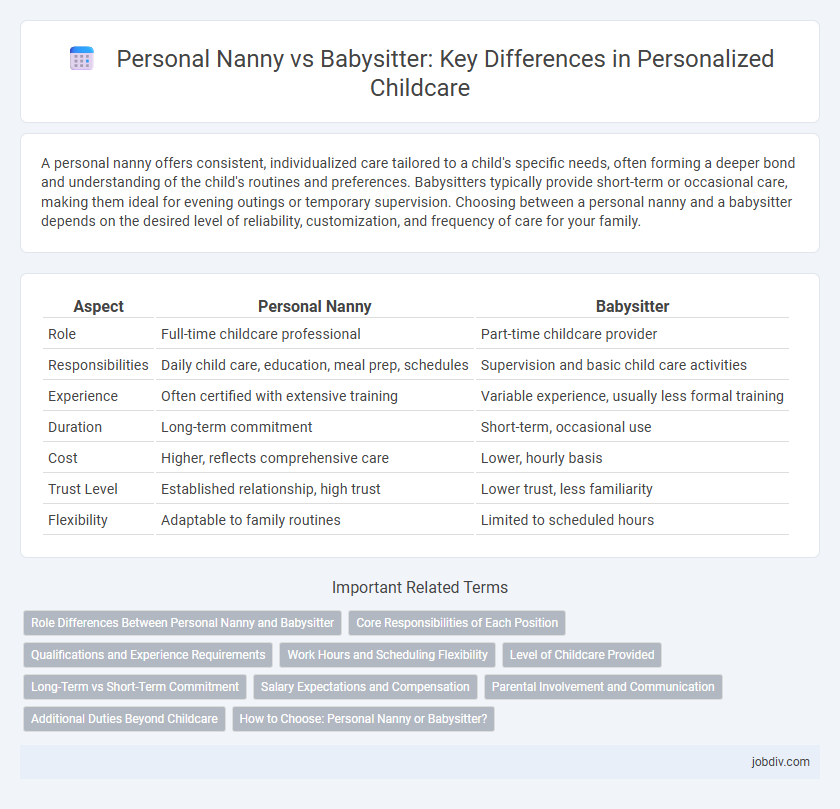A personal nanny offers consistent, individualized care tailored to a child's specific needs, often forming a deeper bond and understanding of the child's routines and preferences. Babysitters typically provide short-term or occasional care, making them ideal for evening outings or temporary supervision. Choosing between a personal nanny and a babysitter depends on the desired level of reliability, customization, and frequency of care for your family.
Table of Comparison
| Aspect | Personal Nanny | Babysitter |
|---|---|---|
| Role | Full-time childcare professional | Part-time childcare provider |
| Responsibilities | Daily child care, education, meal prep, schedules | Supervision and basic child care activities |
| Experience | Often certified with extensive training | Variable experience, usually less formal training |
| Duration | Long-term commitment | Short-term, occasional use |
| Cost | Higher, reflects comprehensive care | Lower, hourly basis |
| Trust Level | Established relationship, high trust | Lower trust, less familiarity |
| Flexibility | Adaptable to family routines | Limited to scheduled hours |
Role Differences Between Personal Nanny and Babysitter
A personal nanny typically assumes a long-term role focused on comprehensive child development, including educational activities, routine management, and emotional support, while a babysitter generally provides short-term, occasional childcare primarily for supervision and safety. Nannies often engage in meal preparation, transportation, and coordinating schedules, integrating into the family's daily life, whereas babysitters handle basic care and entertainment during parents' absence. Understanding these role differences helps families determine the right childcare option based on their specific needs and expectations.
Core Responsibilities of Each Position
A personal nanny provides consistent, long-term childcare, focusing on the child's overall development, daily routines, educational activities, and emotional support within the family environment. Babysitters are typically hired for short-term or occasional care, primarily ensuring the child's safety and basic needs such as feeding and supervision during the caregiver's absence. Nannies often have a more comprehensive role including meal preparation, transportation to activities, and establishing bedtime routines, while babysitters handle immediate childcare tasks without broader household responsibilities.
Qualifications and Experience Requirements
A personal nanny typically possesses formal training in child development, CPR certification, and several years of hands-on experience managing diverse age groups, ensuring comprehensive care and educational support. Babysitters often have basic first aid knowledge and limited experience, primarily offering short-term or occasional supervision rather than long-term developmental guidance. Families seeking consistent, qualified childcare frequently prefer nannies for their specialized skills and proven reliability.
Work Hours and Scheduling Flexibility
A personal nanny typically offers consistent work hours with a structured schedule tailored to the family's needs, often providing full-time or part-time care. Babysitters usually work on an as-needed basis, offering greater scheduling flexibility for occasional or short-term childcare. Families seeking reliable daily support often prefer nannies, while those requiring occasional assistance find babysitters more suitable.
Level of Childcare Provided
A personal nanny offers comprehensive, consistent childcare tailored to a child's developmental needs, including educational activities, meal preparation, and personalized routines. Babysitters typically provide short-term, occasional supervision focused on basic safety and entertainment rather than developmental support. The level of childcare from a nanny is generally more specialized and long-term, fostering strong caregiver-child bonds and overall growth.
Long-Term vs Short-Term Commitment
A personal nanny typically offers long-term commitment, providing consistent care and building a strong bond with the child and family over time. Babysitters are generally engaged for short-term or occasional needs, making them ideal for occasional or emergency childcare. Choosing between the two depends on the family's scheduling needs and desire for continuity in childcare.
Salary Expectations and Compensation
Personal nannies typically command higher salary expectations than babysitters due to their broader range of responsibilities and long-term commitment to children's care. Average personal nanny wages range from $600 to $1,200 per week, often including benefits such as health insurance and paid time off, while babysitters generally earn $15 to $25 per hour without additional benefits. Compensation packages for nannies may also include room and board, making the overall value significantly greater compared to casual babysitting services.
Parental Involvement and Communication
Personal nannies foster consistent daily communication and active parental involvement, tailoring care routines to a child's unique needs and family preferences. Babysitters typically offer more flexible, short-term supervision with less emphasis on ongoing parental updates or detailed progress reports. Prioritizing a personal nanny supports stronger collaboration between parents and caregiver, enhancing trust and developmental support for the child.
Additional Duties Beyond Childcare
A personal nanny often handles additional duties beyond basic childcare, including meal preparation, educational activities, and household organization tailored to the child's routine. Babysitters typically focus on short-term supervision without extensive responsibilities or long-term care planning. Nannies provide a more comprehensive role that supports the family's daily lifestyle and developmental goals.
How to Choose: Personal Nanny or Babysitter?
Choosing between a personal nanny and a babysitter depends on the level of care and consistency needed for your child. Personal nannies provide long-term, personalized care with responsibilities often extending beyond supervision to include educational activities and household tasks. Babysitters offer flexible, short-term childcare primarily for occasional use, focusing on basic supervision and safety during limited hours.
Personal Nanny vs Babysitter Infographic

 jobdiv.com
jobdiv.com